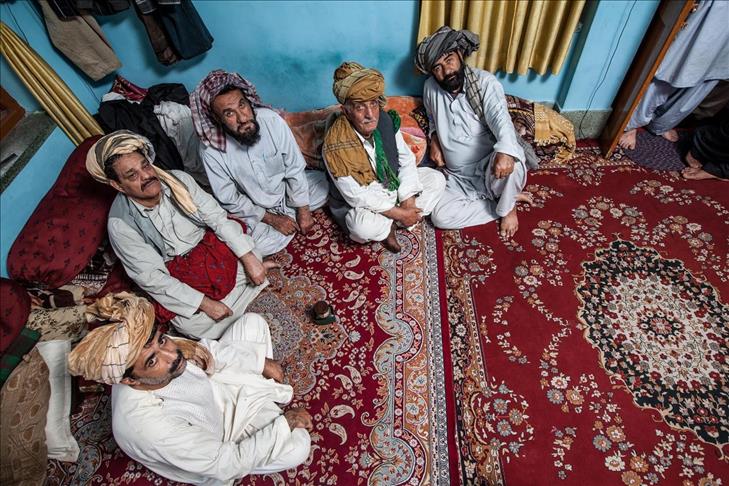
By Shadi Khan Saif
KABUL, Afghanistan
Afghans have travelled to India for centuries but it was in the 19th century that they were given a romantic, and lasting identity.
This link was set into history when the iconic Bengali writer Rabindranath Tagore penned his story about the "Kabuliwala," or man from Kabul, recording the presence of a community of Afghans who had made a second home in Kolkata, in present-day West Bengal.
Younger generations of Afghans have been reintroduced to the forgotten settler community this week, with the opening of an exhibition dedicated to the modern-day Kabuliwalas of Kolkata was opened.
Inspired by Tagore's story, which the Nobel laureate wrote in 1892, photojournalists Moska Najib and Nazes Afroz embarked on a project to tell the story of a century of social transformations within the community.
Tagore's story, which has been translated and adapted for cinema and stage, tells the story of a tall, hefty dry fruit-seller who is reminded of the daughter he left behind in Afghanistan when he is befriended by a young Bengali girl.
Afroz, an Indian journalist, said at the exhibition's launch that the series will connect viewers to the themes of human bonding, as narrated by Tagore, and will also touch on the issues of loss of identity and a new sense of belonging.
"Viewers will experience the tension between preserving an identity and rebuilding a home in a new space," Afroz noted.
He told The Anadolu Agency that the 21st century Kabuliwala in Kolkata were very different to the one Tagore portrayed in his epic story.
Then, the Kabuliwalas were strangers, with distinct features who had arrived in Kolkata; they were not yet familiar with their surroundings, nor had the locals yet become used to the new arrivals.
Now, he said, intermarriage has changed the community, who eat Bengali food but still dance their traditional "Attan" dance on important occasions.
Afroz pointed out however that the Kabuliwala identity is at risk.
"There are three types of them; ones that can be described as the offspring of Kabuliwala from the 19th century, the second ones that came to India during the colonial era and the third is of those who came here during the past four decades of conflict in Afghanistan," he said.
He added that most of the original Kabuliwala actually descended from the southeastern Afghan provinces of Paktika and Paktia provinces but were given their label because the name of the current Afghan capital of Kabul once applied to the whole of the northwestern Indian subcontinent, before its partition at the end of colonial rule.
The 1947 partition of the sub-continent meant for the first time the Kabuliwalas, who were used to freely traveling from their mountainous villages to the urban centers of India, were restricted in their movement.
"When a third country emerged in the middle of India and Afghanistan, called Pakistan, the Kabuliwalas started facing hurdles in regard to the documents and the rift between Delhi and Islamabad," Ummar Amin, an Afghan who lived in Kolkata for more than 6 years, told AA.
Amin said he was overwhelmed to see the lives of his former friends documented in the exhibition.
"These Kabuliwalas have not only preserved their identity and culture in a far away land but have also proved their respect and understanding to the host nation by co-existing with them for over a century," Amin said.
Afroz said many Kabuliwalas carry mementos of their past with them, either scribbled on a piece of paper or in a passport.
Anadolu Agency website contains only a portion of the news stories offered to subscribers in the AA News Broadcasting System (HAS), and in summarized form. Please contact us for subscription options.

